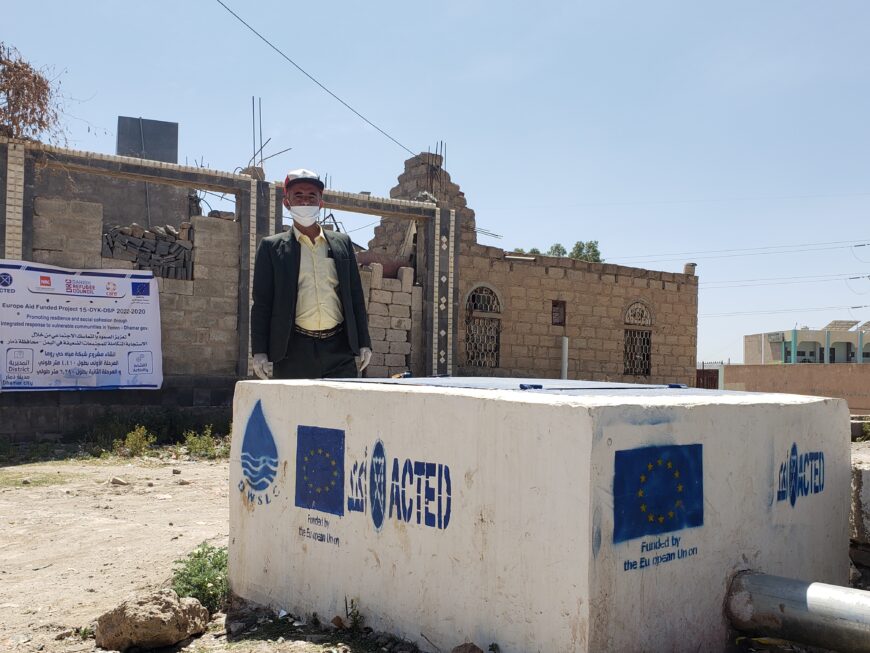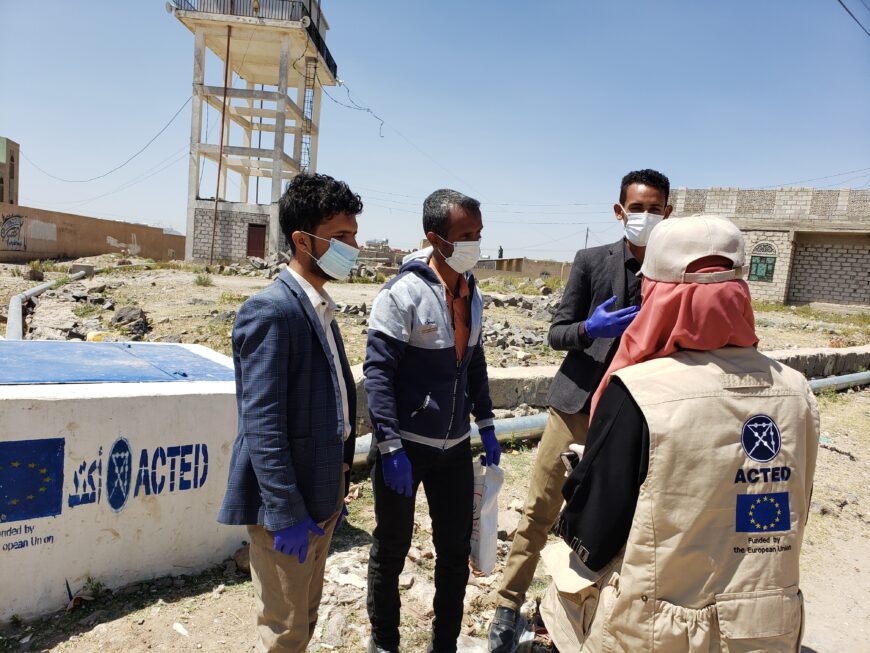Conflict in Yemen has destroyed critical water infrastructure severely compromising access to clean water. Often with no nearby access to clean water, families have to walk long distances to the closest water source. Water scarcity is also impacting areas which are hosting a large number of displaced communities, contributing to tensions over scarce water resources.
Today as we celebrate World Water Day we are reminded that over 15 million Yemenis are estimated to lack access to clean water and sanitation, making the population more vulnerable to water borne diseases such as cholera.
To help communities meet their basic needs and improve access to water, ACTED is taking action to support the rehabilitation of water infrastructures in the most affected regions. This work is part of the EuropeAid-funded project ‘Promoting Resilience and Social Cohesion Through an Integrated Response to Vulnerable Communities in Yemen’. ACTED and its 5 partner NGOs : NRC, DRC, SFCG, IRC and CARE seek to implement durable solutions by rehabilitating and constructing public service infrastructures in the most affected regions. ACTED is rehabilitating eighteen water points across both the Dhamar and Lahj Governorates to connect vulnerable households to water
Most recently ACTED has successfully connected over 3000 families from the Roma community to a water supply, providing the community with its first access to a permanent source of water. The Roma neighborhood is a new community, formed mostly by internal migration patterns and population displacement over the last seven years, located in the Dhamar Governorate, in the west part of Yemen near Sanaa.
Roma neighborhood: providing access to water for vulnerable families
ACTED completed the construction of the Roma water network connecting the Roma community to a regular supply of water – the first time the community is benefiting from a permanent water supply.
According to the Director of the Roma Water Unit, “before ACTED’s intervention, the Roma neighborhood did not have a fixed water source, families would often have to travel an hour to the closest well to collect water and when the pump of the well ceased to work, families were forced to travel up to two hours to the next closest water source”.
The construction of the water network and provision of a regular supply of water has been a great asset to the community.

ACTED is currently engaged in an ongoing rehabilitation of 18 water points in both the Dhamar and Lahj Governorates.
Water access in Yemen is essential to avoid the spread of diseases and access to education
Before ACTED’s intervention, the Roma community was vulnerable to the spread of water borne diseases such as diarrhea, and cholera. Often children would drop out of school to support their families collect water which was time consuming.
Now with access to water, families no longer worry about having to travel long distances to collect water. Children, in particular girls, have returned to school, and the phenomenon of children dropping out of schools has decreased. Women, especially pregnant and lactating women, are no longer fearing water scarcity nor for their household’s personal hygienic practices as the hygienic level in the neighborhood has increased with the availability of clean water. The Roma water network covers 1700 families and a school within the neighborhood.
Najeeb Ayyash, the head of an eight-member family and a resident of the Roma neighborhood said, “my house, and especially the bathroom, are now clean and my wife is also able to take care of our children’s hygiene more easily.”
Ayyash’s wife, Abih, added that, “I used to wait the whole day from morning until my children return from school in order to collect water together until sunset, and although we spent the whole day collecting water, the water we collected was still not enough. I am relieved now with the water abundancy, the situation before was humiliating and very difficult for me. Now my kids have time to study and do their homework… now we have a decent life”;
Another community member, Khaizran who has four children explained that she was no longer worried about water shortages. The level of hygiene is better, and she has quality time to spend with her family – spent more wisely than collecting water.

Now with the availability of water, community members of the Roma neighborhood do not have to worry about their inability to provide water for their family members nor pay 12,000 Yemeni Rials for water trucking. Children, in particular girls, have returned to school, and the phenomenon of children dropping out of schools has decreased. Women, especially pregnant and lactating women, are no longer fearing water scarcity nor for their household’s personal hygienic practices as the hygienic level in the neighborhood has increased with the availability of clean water. The Roma water network covers 1700 families and a school within the neighborhood.
